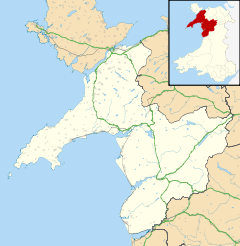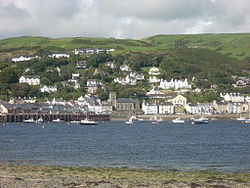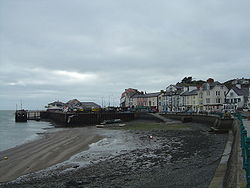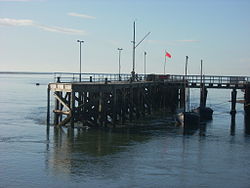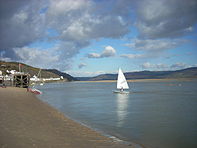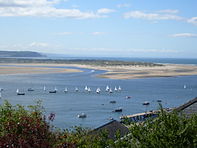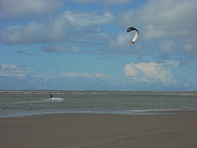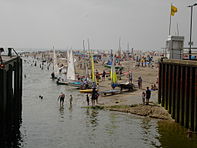- Aberdyfi
-
Coordinates: 52°32′40″N 4°02′40″W / 52.54438°N 4.0444°W
Aberdyfi 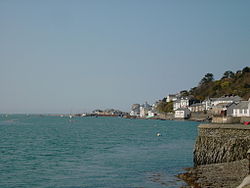
View of Aberdyfi from Penhelig.
 Aberdyfi shown within Gwynedd
Aberdyfi shown within GwyneddPopulation 800 OS grid reference SN615965 Principal area Gwynedd Ceremonial county Gwynedd Country Wales Sovereign state United Kingdom Post town ABERDYFI / ABERDOVEY Postcode district LL35 Dialling code 016 54 Police North Wales Fire North Wales Ambulance Welsh EU Parliament Wales UK Parliament Dwyfor Meirionnydd Welsh Assembly Dwyfor Meirionnydd List of places: UK • Wales • Gwynedd Aberdyfi ( English: Mouth of the River Dyfi), or Aberdovey (the Anglicised spelling is still in common use) is a village on the north side of the estuary of the River Dyfi in Gwynedd, on the west coast of Wales.
The village was founded around the harbour and shipbuilding industry, but is now best known as a seaside resort with a high quality beach.[1][2] The town centre is on the river and seafront, around the original harbour, jetty and beach but it stretches back from the coast and up the steep hillside in the midst of typical Welsh coastal scenery of steep green hills and sheep farms. Penhelig, with its own railway station, is the eastern part of the town.
Aberdyfi is a popular tourist attraction, with many returning holidaymakers, especially from the metropolitan areas of England, such as the West Midlands, which is less than 100 miles to the east. A relatively large proportion of houses in the village are now holiday homes, resulting in high house prices. The town is located within the Snowdonia National Park.
Contents
History
Local tradition suggests that the Romans established a track into Aberdyfi as part of the military occupation of Wales around AD78.[3]
The strategic location in mid-Wales was the site of several conferences between north and south Wales princes in 540, 1140, and for the Council of Aberdyfi in 1216. The hill in the centre of Aberdyfi, Pen-y-Bryn, has been claimed to be the site of fortifications in the 1150s, which were soon destroyed.[3] The site of Aberdyfi Castle however is usually said to be at the motte earthworks further up the river near Glandyfi.[4]
In 1597, a Spanish ship, the Bear of Amsterdam, entered the Dyfi estuary and was unable to leave for 10 days because of the wind. She could not be boarded as no suitable boats were available.[3]
In the 1700s, the village grew with the appearance of several of the inns still in current use (The Dovey Hotel, Britannia and Penhelig Arms). Copper was mined in the present Copperhill Street, and lead in Penhelig.
In the 1800s, Aberdyfi was at its peak as a port. Major exports were slate and oak bark. Ship building was based in seven shipyards in Penhelig where 45 sailing ships were built between 1840 and 1880.[3]
The railway came to Aberdyfi in 1863 built by the Aberystwyth and Welsh Coast Railway. The first train was ferried across the River Dyfi, as the line to Dovey Junction and then Machynlleth was not completed until 1867. Due to public demand, this section had to use a long tunnel behind Aberdyfi, and further major earthworks and tunnels were needed along the bank of the river. This line, which became part of the Cambrian Railways, and later the Great Western Railway, is particularly scenic.[5]
A jetty was built in 1887, with railway lines connecting it with the wharf and the main line. The Aberdyfi & Waterford Steamship Company imported livestock from Ireland which were then taken further by the railway. Coal, limestone and timber were also imported.
Local coastal shipping links with Liverpool were strong, with many Aberdyfi men sailing on international voyages from Liverpool. The S.S. Dora was one of the last ships trading between Aberdyfi and Liverpool and was scuttled, with no loss of life, by a German submarine in 1917.[3]
There have been many chapels built in Aberdyfi. These include the Welsh Calvinistic Methodist chapel, the English Presbyterian chapel, the Wesleyan Methodist chapel, and the Welsh Independent congregational chapel. The (Anglican) Church in Wales is St Peter's, and Christ the King is the Catholic Church.
The jetty and wharf continued in commercial use for coal until 1959. After prolonged negotiations, redevelopments from 1968–1971, including rebuilding the jetty, led to their present use mainly for recreational purposes.[3] Some local fishing still occurs.
The first ever Outward Bound centre was opened in Aberdyfi in 1941.[6] Many of their activities involve the river, boats and jetty.
The football team won the Welsh Amateur Cup Competition in 1934.[7]
The first Aberdyfi lifeboat was bought in 1837. Run by the RNLI since 1853, it has taken part in many rescues, sadly sometimes with loss of life of crew members. The current lifeboat, an Atlantic 75, is housed in the boathouse by the jetty and is launched using a lifeboat tractor. Currently it is averaging about 25 emergency launches each year.[8]
Transport
Road access to Aberdyfi is by the A493, with Tywyn four miles to the north and Machynlleth 11 miles to the east. Aberdyfi is on the Cambrian Coast railway line. The village of Aberdyfi has two railway stations, Aberdovey and Penhelig. Trains on the Cambrian Line are operated by Arriva Trains Wales. The local bus service is also operated by Arriva.
A ferry used to operate across the Dyfi river to Ynyslas. The last ferryman was Ellis Williams.[9]
Recreation
Popular recreational activities focus on the beach and watersports, such as windsurfing, kitesurfing, fishing, crabbing, sailing, and canoeing on the estuary.[2]
- Activities in Aberdyfi
The Dovey Yacht Club has a prominent position on the river front of the village. It was founded in 1949 and helped develop the popularity of the GP14 dinghy class.[10] It organises races for dinghies throughout the season on the estuary of the River Dyfi.
The Aberdovey Golf Club, founded in 1892, is a famous 18 hole links course located only a stones throw from the railway station. It is world renowned, having been described frequently and lyrically in the press by Bernard Darwin, the famed golf writer, who was a notable member of the club. In 1895, it was the location of the first Welsh Golfing Union Championship. Current members include Ian Woosnam and Peter Baker.[11]
The Aberdyfi Rowing Club rows in the Dyfi Estuary and Cardigan Bay and takes part in races all round the coast of Wales and internationally. They row 24’ long Celtic longboats, with four rowers (each with one oar) and a cox. They have three of these traditional Welsh boats with fixed seats and use these for races in Wales.[12]
The Aberdovey Literary Institute, founded in 1882, is situated on the river front. The deeds of 1923 state it was established in perpetuity as "a non-sectarian, non-political place of recreation, education and social intercourse including ... reading rooms, writing rooms, library, billiard rooms, concert rooms ..."
Neuadd Dyfi is a community hall, conference centre and theatre owned by the village for village activities. It caters for a range of local organisations and events.
Clychau Aberdyfi
The village was the subject of the folk song, The Bells of Aberdovey (Welsh: Clychau Aberdyfi). The song refers to the legend of a submerged former kingdom of Cantre'r Gwaelod (English: Lowland Hundred) beneath Cardigan Bay, (Seithennin, the drunkard, is said to have created the bay itself), and its bells which, it is said, can be heard ringing beneath the water. The composer is unknown, but the words were written by John Ceiriog Hughes, during the 19th century.
- Welsh
Os wyt ti yn bur i mi
Fel rwyf fi yn bur i ti
Mal un, dau, tri, pedwar, pump, chwech
Meddai clychau Aberdyfi.
Un, dau, tri, pedwar, pump, chwech, saith
Mal un, dau tri, pedwar, pump, chwech
Meddai clychau Aberdyfi.Hoff gan fab yw meddu serch
Y ferch mae am briodi
Hoff gen innau ym mhob man
Am Morfydd Aberdyfi.
Os wyt ti'n fy ngharu i
Fel rwyf i'n dy garu di
Mal un, dau, tri, pedwar, pump, chwech
Meddai clychau Aberdyfi.Pan ddôf adref dros y môr
Cariad gura wrth dy ddôr
Mal un, dau, tri, pedwar, pump, chwech
Meddai clychau Aberdyfi.
Un, dau, tri, pedwar, pump, chwech
Mal un, dau, tri, pedwar, pump, chwech
Meddai clychau Aberdyfi.Paid â'i wneud yn galon wan
Pan ddaw o dan dy faner
Os bydd gennyt air i'w ddweud
Bydd gwneud yn well o'r hanner
Os wyt ti'n fy ngharu i
Fel rwyf fi'n dy garu di
Mal un, dau, tri, pedwar, pump, chwech
Meddai clychau Aberdyfi.- English
If to me as true thou art
As I am true to thee, sweetheart
We'll hear one, two, three, four, five, six
From the bells of Aberdovey.
Hear one, two, three, four, five, six
Hear one, two, three, four, five and six
From the bells of Aberdovey.Glad's a lad his lass to wed
When she sighed, "I love you!"
When but today on air I tread
For Gwen of Aberdovey.
While the heart beats in my breast
Cariad, I will love thee, by
One, two, three and all the rest
Of the bells of Aberdovey.When I cross the sea once more
And love comes knocking at my door
Like one, two, three, four, five and six
Of the bells of Aberdovey.
One, two, three, four, five and six
Like one, two, three, four, five and six
Of the bells of Aberdovey.Little loves and hopes shall fly
Round us in a covey
When we are married, you and I
At home in Aberdovey.
If to me as true thou art
As I am true to thee, sweetheart
We'll hear one, two, three, four, five, six
From the bells of Aberdovey.Notable residents
- James Atkin, Baron Atkin of Aberdovey (1867–1944), Barrister and Judge
- Oliver Onions (1873–1961), Novelist
- Berta Ruck (1878–1978), Romantic novelist
- Stan Hugill (1906–1992), Musician and artist, lived in Aberdyfi, and worked at the Outward Bound centre from 1950 to 1975.[13]
- Sir John T. Houghton (born 1931), co-chair of the Intergovernmental Panel on Climate Change lives in Aberdyfi.[14]
- Tom Cave (born 1991), rally driver
References
- ^ "Aberdyfi.org". http://aberdyfi.org/. Retrieved 23 April 2011.
- ^ a b "Aberdyfi.com". http://aberdyfi.com/. Retrieved 23 April 2011.
- ^ a b c d e f Lewis, Hugh (1997). Aberdyfi: a chronicle through the centuries.. Aberdyfi: Author.
- ^ "Aberdyfi Motte". http://www.castlewales.com/aberdyfi.html. Retrieved 24 April 2011.
- ^ Christiansen, Rex & Miller, R.W. The Cambrian Railways, Vol. 1 David & Charles (1967)
- ^ Outward Bound International (2004). Birth of Outward Bound. Retrieved December 9, 2007.
- ^ "FAW Welsh Trophy - over 100 years of history". http://blogs.dailypost.co.uk/northwalesfootball/2010/10/-this-saturday-the-last.html. Retrieved 23 April 2011.
- ^ "Aberdyfi Lifeboat". http://www.aberdoveylifeboat.org.uk/. Retrieved 24 April 2011.
- ^ "Williams family tree". http://williamsfamilytree.co.uk. Retrieved 24 April 2011.
- ^ "Dovey Yacht Club". http://www.doveyyachtclub.org.uk/news/gallery/. Retrieved 24 April 2011.
- ^ "Aberdovey Golf Club". http://www.aberdoveygolf.co.uk/. Retrieved 24 April 2011.
- ^ "Aberdyfi Rowing Club". http://www.aberdyfirowingclub.com. Retrieved 24 April 2011.
- ^ Stan Hugill
- ^ John T. Houghton
External links
 Chisholm, Hugh, ed (1911). "Aberdovey". Encyclopædia Britannica (11th ed.). Cambridge University Press.
Chisholm, Hugh, ed (1911). "Aberdovey". Encyclopædia Britannica (11th ed.). Cambridge University Press.- Aberdyfi.com Events & News
- Aberdyfi.org Tourism website
- Neuadd Dyfi website
- Aberdyfi travel guide from Wikitravel
- BBC Aberdyfi site
- BBC Cantre'r Gwaelod legends site
- Aberdovey Golf Club
- Windsurfing and Kitesurfing Aberdyfi
- Aberdyfi Lifeboat
- Aberdyfi Rowing Club
- www.geograph.co.uk : photos of Aberdyfi and surrounding area
Gwynedd Principal settlements Bala • Bangor • Barmouth • Bethesda • Blaenau Ffestiniog • Caernarfon • Criccieth • Dolgellau • Ffestiniog • Harlech • Nefyn • Porthmadog • Pwllheli • Tywyn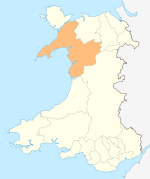
Towns and villages Aberangell • Aberdaron • Aberdesach • Aberdyfi • Abererch • Abergeirw • Abergwyngregyn • Abergynolwyn • Aberllefenni • Abersoch • Abertrinant • Afon Wen • Anelog • Arthog • Beddgelert • Bethania • Bethel • Bethesda • Betws Garmon • Bodferin • Boduan • Bontddu • Bontnewydd • Botwnnog • Bryncroes • Bryn-crug • Brynrefail • Buan • Bwlch-derwin • Caeathro • Capel Celyn • Carmel • Carnguwch • Ceidio • Chwilog • Clwt-y-bont • Clynnog Fawr • Corris Uchaf • Corris • Croesor • Cwm y Glo • Deiniolen • Dinas • Dinas Dinlle • Dinas Mawddwy • Dinorwig • Dolbenmaen • Dolmelinllyn • Dwygyfylchi • Edern • Efailnewydd • Eisingrug • Fairbourne • Friog • Frongoch • Ganllwyd • Garndolbenmaen • Garneddwen • Gellilydan • Glasinfryn • Groeslon • Llan Ffestiniog • Llanaber • Llanaelhaearn • Llanarmon • Llanbedr • Llanbedrog • Llanberis • Llandanwg • Llandegwning • Llandeiniolen • Llandudwen • Llandwrog • Llandygai • Llanegryn • Llanelltyd • Llanengan • Llanfaelrhys • Llanfaglan • Llanfair • Llanfihangel Bachellaeth • Llanfihangel-y-Pennant • Llanfihangel-y-Pennant, Dolbenmaen • Llanfrothen • Llangelynnin • Llangian • Llangwnnadl • Llangybi • Llaniestyn • Llanigian • Llanllechid • Llanllyfni • Llannor • Llanrug • Llanuwchllyn • Llanwnda • Llanymawddwy • Llanystumdwy • Llithfaen • Llwyndyrys • Llwyngwril • Maentwrog • Mallwyd • Mellteyrn • Minffordd • Morfa Bychan • Morfa Nefyn • Mynydd Llandygai • Mynydd Nefyn • Mynytho • Nantlle Valley • Rhostryfan • Nantmor • Nasareth • Nebo • Pant Glas • Penffridd • Penisa'r Waun • Penllech • Penllyn • Penmaenpool • Pennal • Penrhos • Penrhyndeudraeth • Pentre Gwynfryn • Penygroes • Pen-y-meinl • Pistyll • Pontrug • Porthdinllaen • Portmeirion • Prenteg • Rachub • Rhiwddolion • Rhosgadfan • Rhoshirwaun • Rhoslefair • Rhos-y-gwaliau • Rhyd Ddu • Rhyd • Rhydyclafdy • Sarn Meyllteyrn • Soar • Talsarnau • Tal-y-bont (near Bangor) • Tal-y-bont (near Barmouth) • Talysarn • Tanygrisiau • Trawsfynydd • Trefor • Tregarth • Tremadog • Tudweiliog • Tywyn • Waunfawr • Y Felinheli • Y Ffor • Y Fron • Y RhiwUniversities and colleges Castles and forts Rivers Afon Artro • Afon Cwmnantcol • Afon Dwyryd • Afon Dysynni • Afon Fathew • Afon Glaslyn • Afon Llyfni • Afon Mawddach • Afon Rhythallt • Afon Seiont • Afon TrywerynIslands Categories:- Towns in Gwynedd
- Tourism in Gwynedd
- Seaside resorts in Wales
- Beaches of Wales
Wikimedia Foundation. 2010.

